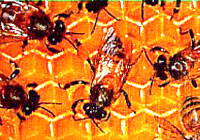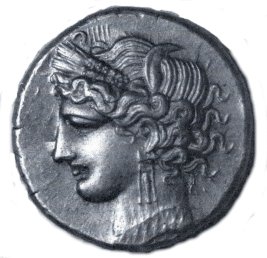Virgil's Aeneid
Book 1
Part 5 Aeneas enters Carthage, and finds his men (418 - 612)
Aeneas finds Carthage a hive of activity
Meanwhile they charged ahead, the way the path led them. Soon they were climbing a hill, which overlooked the whole city, and gave a view of the project from above. Aeneas found the scale of it amazing: he was amazed at the gates, the buzz, the paved streets where just now had been mud huts. The Tyrians were focused on their work and excited by it: some were driving themselves to finish the walls of the citadel, manually dragging great rocks into place, others were choosing a site for a house, and demarcating the boundary with a plough; they were setting down laws and electing magistrates and an august-looking senate. Here another group were excavating harbours; another here were laying down deep foundations for a theatre, or were chiselling massive columns from the rock, planned as imposing adornments for the yet-to-be-built stage.
 It was like the energy that motivates the bees in a flower meadow at the start of summer when the sun is shining, when they bring out the fully-grown larvae, or when they drip the runny honey to fill up the cells with the sweet nectar, or relieve the incoming workers of their burdens, or swarm out to drive the lazy gang of drones away from the hives; there's a buzz about the activity, and the honey is aromatic with the scent of thyme.
It was like the energy that motivates the bees in a flower meadow at the start of summer when the sun is shining, when they bring out the fully-grown larvae, or when they drip the runny honey to fill up the cells with the sweet nectar, or relieve the incoming workers of their burdens, or swarm out to drive the lazy gang of drones away from the hives; there's a buzz about the activity, and the honey is aromatic with the scent of thyme.
"How the gods must love this people, whose walls are already rising!" said Aeneas, looking wistfully over the roofs of the city. He went down and mingled with the crowds, invisible to all, thanks to the magic cloak of mist. [440]
Even in Carthage, the Trojan War is famous!
In the centre of the city, providing most welcome shade, there was a clump of trees, which the Phoenicians, having surmounted their battering by the wind and waves, had been led straight to by Juno, queen of heaven: there they dug up the head of a prancing horse, a sign that their people would be dominant in war, and find the struggle for survival easy over the coming centuries. Here Sidonian Dido built a great temple to Juno, richly endowed with gift-offerings, and where the presence of the goddess could be felt. The entrance was high up, reached by steps. The lintel was bonded with bronze, and the hinges creaked with [the weight of] the bronze doors. In this grove, there occurred something strange, which, for the first time, allayed his fear, here for the first time Aeneas dared to hope for a safe outcome, and to build up confidence after his shattering experiences. For while he was taking in the details as he strolled around the temple, waiting for the queen, while he marvelled silently at the success of the city - the skilled handiwork of its craftsmen, and the workmanship of the structures - he saw, all in correct sequence, the events of the fighting at Troy, the now world-famous war: the Atridae and Priam, and Achilles who was uncompromising to both. He stood still, and with tears in his eyes he said: "Is there any place, Achates, any country on earth not abreast of our sufferings? Look, Priam. Even here there is due reward for the praiseworthy. Tears are something universal; they touch our hearts through the humanity we all share. Forget your fear. Our reputation will somehow bring you salvation." [462]
So he spoke, and the pictures,inanimate though they were, fed his imagination. He sighed deeply, and his face streamed with tears. For he saw in one where the Greek bringers of war were in flight around Pergamum, while the young Trojans were at their heels, in another the Phrygians ran away, as Achilles in his helmet with crest loomed over them in his chariot. Not far away he wept as recognised the snow-white canvas of Rhesus' tents, which bloody Tydides flattened, just as the men had gone off to sleep, then drove away the excited horses into his own camp, before they'd even had a taste of the grass at Troy, or drunk a drop from the river Xanthus. In another section Troilus, a feckless young man, had lost his armour and was fleeing from his unequal encounter with Achilles, being dragged along by his horses, on his back, but still grasping the reins, and clinging on to the empty chariot. His neck, and his hair were bouncing on the ground, while his downward-pointing spear scraped a line in the dirt. Elsewhere the Trojan ladies were processing towards the temple of Athena, biased against them though she was, with their hair down, reverently carrying the peplos, and solemnly beating their breasts with their hands.The goddess averted her gaze, eyes fixed on the ground. Achilles had already dragged Hector three times round the walls of Troy, and was selling his lifeless corpse for gold. Then Aeneas cried out aloud, instinctively reacting to the emotion he felt, when he saw the stolen armour, the chariot, and the actual body of his friend, and Priam, so vulnerable, begging for mercy. He also recognised himself in a mêlée with the leading Achaeans, and the reinforcements from the lands of the Dawn, and the black Memnon in full armour. The demonic Penthesilea was leading columns of Amazons, with their half-moon-shaped shields, and inspiring her troops. Eager for battle, she was adjusting the golden leather straps which supported her décolletage, a girl daring to do battle with men. [493]
Dido's entrance
While Dardan Aeneas was studying these amazing pictures, while he was transfixed staring at one image in front of him, Dido, at her loveliest and most beautiful, strode into view, with a large entourage of young men. Just as Diana, on the banks of the Eurotas, or across the ridges of Mount Cynthus, her quiver slung on her shoulder, keeps fit with her corps de dance, pursued and mobbed by a thousand Oreads, standing out from all the other goddesses as she moves (and bringing a quiet pleasure to Latona's bosom): so was Dido, so did she carry herself through the crowds, happily overseeing the work in progress, and her developing domain. Then passing through the doors of the goddess, in the central arcade of the temple, she took her place, with her bodyguards, on her raised throne, and sat down. [506]
She was dispensing law and justice to her people, and distributing jobs with fair division of labour, or else allocating it by lot, when suddenly Aeneas saw coming into the great concourse Antheus and Sergestus and brave Cloanthus, and others of the Trojans who had been dispersed in the storm and the darkness, and washed up far apart on distant coasts. Aeneas and Achates were both dumbstruck, smitten equally with relief and fear. They were eager, hungry to join hands with them, but their minds were bewildered by the unexpectedness of it all. They stayed hidden, and, blanketed in the cloud of mist, watched to see what had happened to the men, what beach they'd left their ships on, why they were here. For representatives from each ship were approaching to ask for consideration, and making their way to the temple amid the shouting crowd. [519]
Ilioneus speaks for the Trojans
Ater they had entered, and permission to speak had been granted, Ilioneus, the most senior, began calmly: "Your majesty, as one whom Jupiter has allowed to establish a kingdom, and rein in her spirited subjects through the rule of law, we wretched Trojans, wind-blown voyagers over every sea, beg this of you: stop the criminal element setting fire to our ships; we are an honourable race: show us respect in turn; don't jump to conclusions about us. We are not here to pillage Libyan homes and kill your people, or to seize property and stow it on board our ships; a violent temperament and bad manners do not suit the defeated. There is a place, the Greeks call it by the name Hesperia, an ancient country, famous for its strong warriors and its rich soil. Men called Oenotrians brought agriculture; now the word is that their descendants have called themselves Italians, from the name of their leader. [534] This was where we were headed, when suddenly the rising of Orion bringer of storms carried us with the tide into the featureless shallows, and then thanks to the vicious south winds back into the swell, where the breakers overwhelmed us and drove us on to hidden reefs. From here a few of us managed to swim to your coast.
What kind of men are these? What country tolerates such barbaous conduct? We are denied the sanctuary of the beach. They make war on us, and refuse to let us land. You may have no respect for mankind, and no fear of human retaliation, but at least don't be surprised if the gods keep score of right and wrong. We had a king, Aeneas; no one was fairer, or more honourable, or a greater leader in war. If the fates still keep the man safe, if he still draws breath and is not sleeping with the pitiless shades, there is nothing for you to fear: you would not regret taking the initiative in doing the right thing: there are cities in parts of Sicily, and troops, and the great Acestes, of Trojan ancestry. Let us beach our storm-tossed ships, cut planks in the forest, and trim oars, so we may gladly head for Italy and Latium, if there's a chance of continuing to Italy with our commander and our friends restored to us. But if all chance of rescue is past, and the Libyan sea has you, great father of the Trojan people, and there remains no hope that Iulus lives, at least we can sail back to Sicily, where we set out from, and where a home awaits us with king Acestes." So said Ilioneus; and all the Dardans applauded with one voice. [560]


 While Dardan Aeneas was studying these amazing pictures, while he was transfixed staring at one image in front of him, Dido, at her loveliest and most beautiful, strode into view, with a large entourage of young men. Just as Diana,
While Dardan Aeneas was studying these amazing pictures, while he was transfixed staring at one image in front of him, Dido, at her loveliest and most beautiful, strode into view, with a large entourage of young men. Just as Diana, 
![[Next Page?]](next.gif)